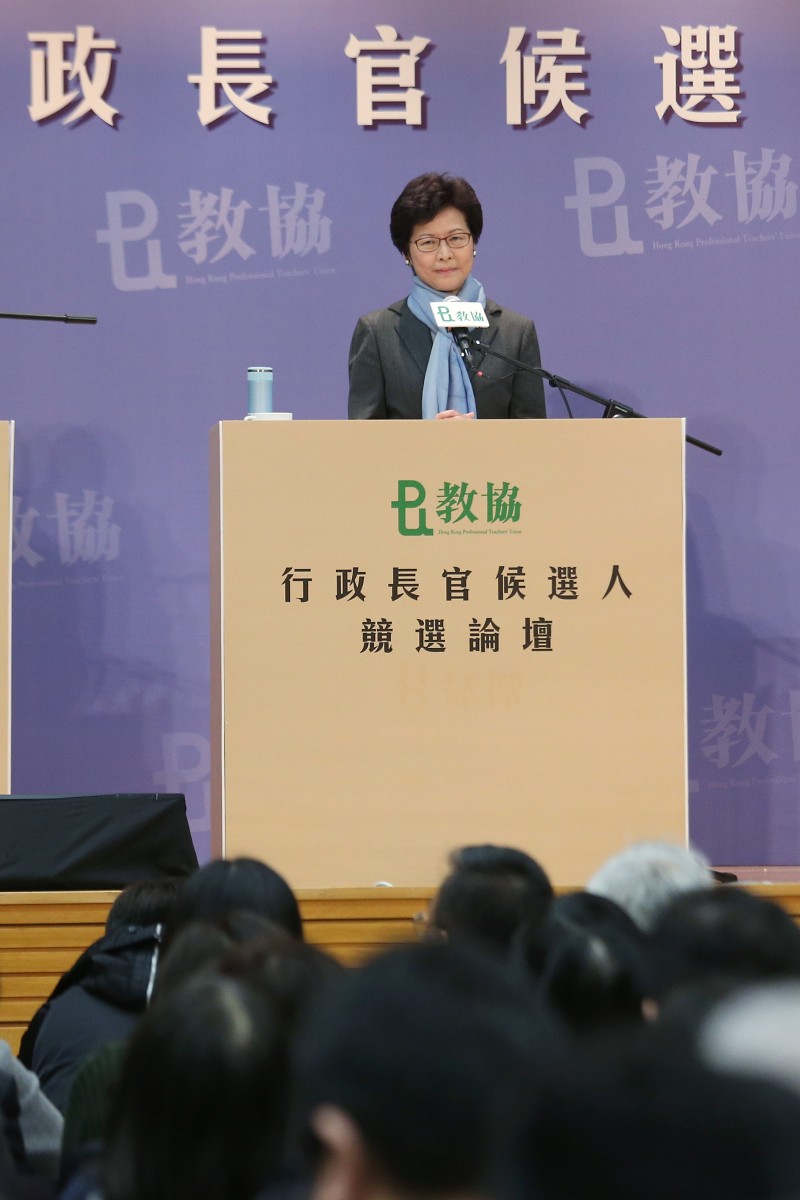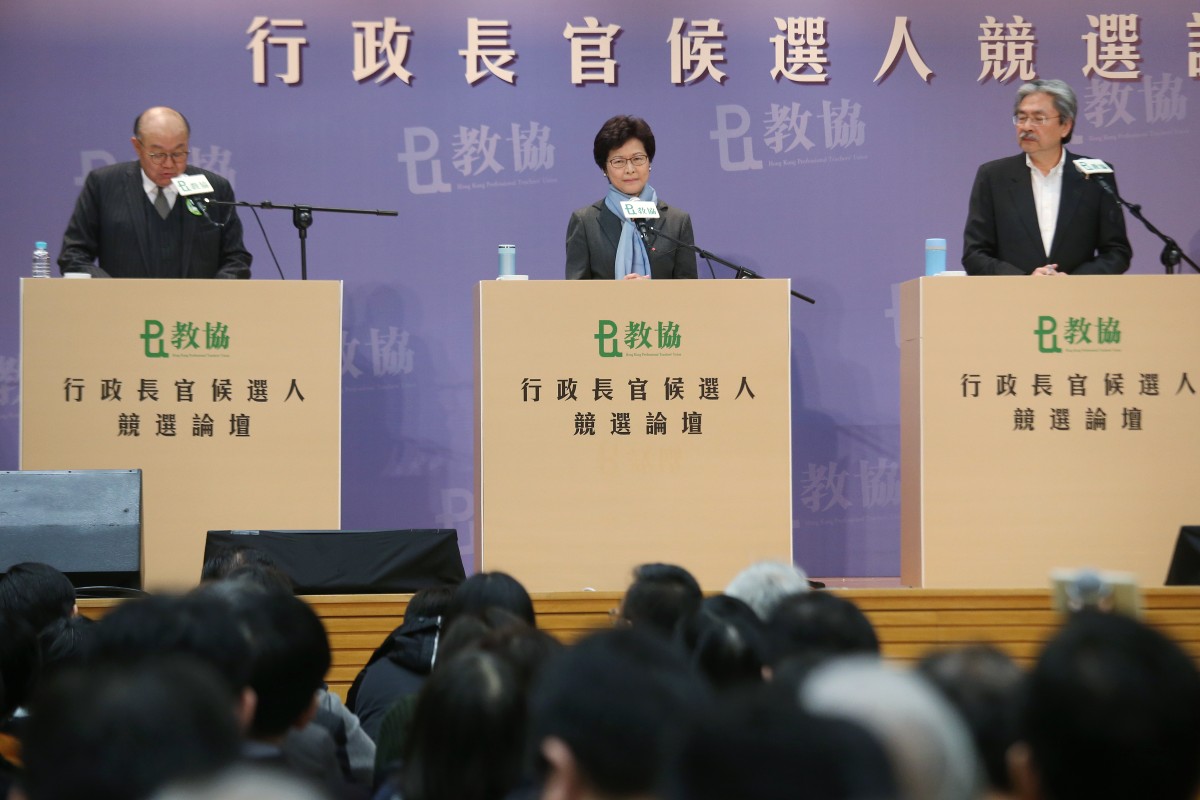
Face Off: Should pro-democracy Election Committee members vote for a pro-establishment candidate for CE?
Each week, two of our readers debate a hot topic in a parliamentary-style debate that doesn’t necessarily reflect their personal viewpoint. This week’s topic is ...
 (L-R) Chief Executive candidates Woo Kwok-hing, Carrie Lam, and John Tsang attend 2017 Chief Executive Election forum hosted by HK Professional Teachers' Union.
(L-R) Chief Executive candidates Woo Kwok-hing, Carrie Lam, and John Tsang attend 2017 Chief Executive Election forum hosted by HK Professional Teachers' Union.Cedric Li, 17, Sha Tin College
The chief executive (CE) election has become really chaotic with all sorts of accusations against the three candidates. In such a scenario, Hong Kong’s pan-democrats should identify a realistic goal.
Although it would be desirable to have full democracy, this is not practical because Beijing is against it. Therefore, the best we can hope for is to maintain the status quo, where Hong Kong has a largely independent legislature and judiciary. China is unlikely to give more ground, so the question is how can we prevent the central government from gaining more influence in Hong Kong? The answer is: vote in the CE election.
Politics has always been a game of compromise. The pro-democracy camp won 326 seats in the 1,194-member Election Committee. So they have significant bargaining power, which can be used to their advantage on domestic issues.
One of the biggest barriers for constructive politics in Hong Kong is the persistent animosity between the city’s pan-democrats and the pro-establishment camp. If the former can offer an olive branch by backing a pro-Beijing candidate in the CE election, it could be the start of a momentous shift in Hong Kong politics. Even if the candidate fails to win, the support provided by the pro-democracy camp will not be forgotten.
Also, the central government has always taken a tough stance towards subversion in Hong Kong. For example, boycotting the CE election could make Beijing more angry and they may impose more control over the city. In contrast, political stability will encourage the mainland government to take a more passive approach, allowing Hong Kong to maintain the high degree of autonomy as promised in the Basic Law.
As children, we were told the story of The North Wind and the Sun. In the story, the North Wind tries to force the traveller to remove his cloak by blowing a cold, fierce wind at him. Yet this only prompts him to wrap his cloak tighter. And all the North Wind’s attempts were in vain. The Sun, on the other hand, simply begins to shine, and as the weather becomes hotter, the traveller removes his cloak and sits under the shade of a tree.
In politics, perhaps it is wiser to act more like the Sun than the bellicose North Wind.
Rai Anna-L, 18, University of Hong Kong
The chief executive election is around the corner. Understandably, public scrutiny over the nomination process and CE candidates has been fierce over the past few months. This increased attention has led to greater political participation and resulted in some significant outcomes. I specifically refer to the city’s democratic camp seizing a record quarter of the seats in the committee that will pick Hong Kong’s next leader on March 26.
As the pan-democrats now have more influence over electing the new CE, the debate is how they should utilise this new-found power. Some have even suggested that they should vote for a pro-establishment candidate because the odds are still not in favour of the pro-democracy camp. I don’t agree.
The two groups have completely different political beliefs. The pro-democracy camp comprises different political parties but they share the same core values such as universal suffrage, freedom of expression, and the rule of law. If they were to endorse a pro-establishment candidate, it would be an act of giving up their cherished dreams. Some experts may see the wisdom of choosing a candidate from the opposing camp as a case of selecting the “lesser of two evils”. However, this ignores the value of political competition.
Pan-democrats have never shied away from challenging the government on key issues that affect the community. They have won many important battles, thanks to their never-say-die spirit. Not giving an inch now may lead to a pan-democrat never being able to take part in a CE election, but it also means standing up for the values they cherish.
Another important factor to consider is public trust. Election committee members are voted in by members of functional constituencies who expect the person they support to represent their views. The public spoke when 326 seats of the nearly 1,200-member Election Committee were won by the pro-democracy camp. Disrespecting their opinion would only break the trust placed by the people on the Election Committee members.
In the current politically charged atmosphere, it is easy to be disheartened by the status quo. Nevertheless, pan-democrats must remember not every battle can be won, and small steps would eventually help change the political landscape for the better.